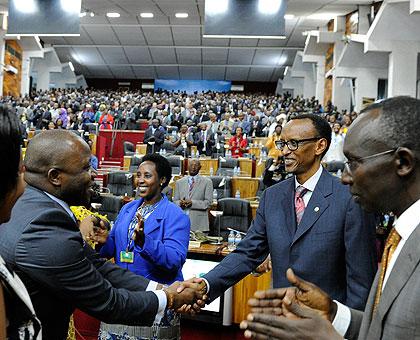Rwandans need to remain united and focus on delivering good services in all sectors and move swiftly to implement values of working hard, producing more, and saving more to achieve financial independence and decent livelihood, participants at Umushyikirano 2013 have resolved.


Rwandans need to remain united and focus on delivering good services in all sectors and move swiftly to implement values of working hard, producing more, and saving more to achieve financial independence and decent livelihood, participants at Umushyikirano 2013 have resolved.
For two days since Friday until yesterday, more than 1,000 Rwandans living in Rwanda and abroad as well as the country’s development partners discussed burning issues for national development.
The 11th National Dialogue Council, best known as Umushyikirano, has generated ideas on what Rwandans need to do in order to achieve the dream of making the country a middle income economy by 2020.
The meeting has drawn nearly 30 resolutions that need to be vigorously implemented over the next one year, including fast-tracking access to financial loans for Small and Medium Enterprises, improving service delivery in both private and the public sector, and instituting a maternity guarantee fund.
Among other resolutions, collecting and paying pension dues on time was also going to be strengthened, Umuganda Community work would be carried out more effectively, and unity and reconciliation among Rwandans will be heavily promoted through Ndi Umunyarwanda(I am Rwandan) initiative.
President Paul Kagame who chaired the meeting urged faster delivery of quality services over the next few years, and strongly advised that Rwandans need to feel confident enough to do what they think was good for them.
"It is clear that Rwanda has made great strides in the right direction. The ideas (from Umushyikirano) will help in the journey to build our country. Let’s move to the implementation because that’s what is important,” Kagame said, highlighting that it was important to "walk the talk”.
The Head of State advised Rwandans to keep defining their interests and always be proud of who they were instead of wanting to be what others would like them to be.
"Being Rwandan is a size. It is what fits us. I would rather choose to be myself,” he told the cheering audience of participants at the meeting held at Parliamentary Building in Kimihurura, Kigali.
The meeting also highlighted plans laid out in the country’s development blueprint, the second Economic Development and Poverty Reduction Strategy (EDPRS2), a Rwf10-trillion five-year plan from 2013 to 2018 that will deliver Rwanda to a middle income status.
The plan will require the country’s Gross Domestic Product (GDP) per capita to double over the same period, a target whose achievement many participants said will clearly depend on Rwandans owning their development path.
"I like the fact that we resolve to be owners of these development programs. We need to understand that we are doing these things for ourselves and that’s the only way we can successfully move forward,” a member of the Rwandan Diaspora in Canada, Beatrice Ufitingabire, said after attending the meeting.
Many participants told The New Times that the meeting had the potential to boost improved governance in the country as more and more citizens use it to hold their leaders accountable.
"I like that Rwandans are asking tough questions and leaders have to respond immediately,” said Lewis Murahoneza who flew in from Brussels, Belgium.
Francine Nduwumwe who lives in Kigali said that attending the meeting helped her to learn more about Ndi Umunyarwanda as a healing and reconciliation initiative and spurred more hope that corrupt leaders will be swiftly prosecuted.
She also welcomed the resolution from the meeting to efficiently manage the government-sponsored $13.4-million Business Development Fund (BDF) to better ensure that 75 per cent of collateral is assured to banks when Small and Medium Sized Enterprises or local cooperatives apply for loans in bank to implement their projects.
"We need to access its funds and I hope they (the fund managers) will stop saying that they don’t have enough funds for loans when they can’t even let us use the little money that is available,” she said in an interview.
Officials within the Rwandan government hope to use the opinions and recommendations from Umushyikirano 2013 to help them understand specific obstacles to the implementation of the country’s development plans and take appropriate actions, the meeting’s official website indicates.


